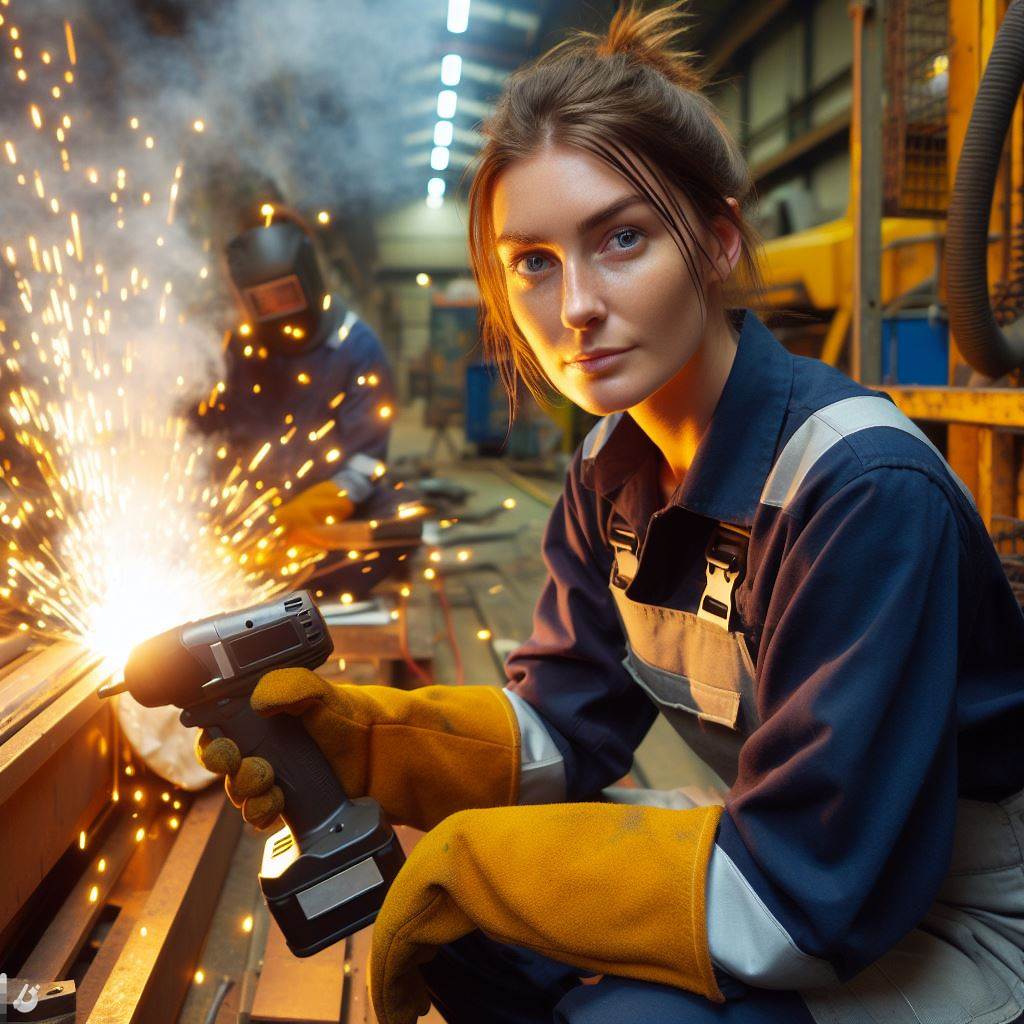Introduction
Construction boom in Australia
The construction boom in Australia has been a significant driver of economic growth in recent years. It has created numerous job opportunities and increased the demand for skilled workers, particularly welders.
This blog post will discuss the importance of welders in the construction industry and provide an overview of its content.
Importance of welders in the construction industry
The construction boom in Australia has been fueled by a surge in infrastructure projects and residential developments.
Welders play a crucial role in the construction industry as they are responsible for joining metal parts together.
This blog post will delve into the skills required to become a welder, the different types of welding techniques, and the job prospects in the construction sector.
Join us as we explore the world of Aussie welders and their contribution to the construction boom.
The Current State of the Construction Industry in Australia
Statistics on the growth of the construction sector
- The construction industry in Australia is experiencing significant growth in recent years.
- According to official statistics, the sector has grown by an average of 5% per year.
- In 2019, the construction industry accounted for 9% of the country’s GDP.
- It employed approximately 1.2 million people, which represents around 9% of the total workforce.
- The value of the construction work done in Australia reached AUD 247 billion in 2019.
Factors contributing to the construction boom
Australia’s construction boom is fueled by population growth, driving demand for infrastructure and housing.
Investments in roads and bridges contribute, creating a favorable environment.
The surge in residential construction adds to the industry’s momentum.
As the population expands, the need for more facilities grows, presenting opportunities for welders.
In construction projects, welders are crucial for fabricating metal parts, ensuring structures’ strength and durability.
The demand for skilled welders has surged, particularly in booming cities like Sydney, Melbourne, and Brisbane.
Welders with experience and qualifications enjoy competitive salaries and positive job prospects.
Staying updated on industry trends and technologies is crucial for welders to remain competitive.
Continuous skill and knowledge updates help welders adapt to the construction industry’s changing needs.
In essence, Australia’s construction industry is thriving due to population growth, infrastructure projects, and residential construction.
Welders, playing a vital role, can expect positive job prospects by staying updated and maintaining their skills.
Role of Welders in the Construction Industry
Definition and importance of welding in construction
Welding in construction refers to the process of joining metal pieces together using heat and pressure. It plays a crucial role in the industry as it ensures the structural integrity and safety of various construction projects.
Types of welding techniques commonly used in construction projects
Arc welding
Arc welding involves the use of an electric arc between an electrode and the base material to melt and fuse metal.
Gas welding
Gas welding relies on the combustion of a fuel gas mixed with oxygen to create a high-heat flame for melting and joining metals.
TIG welding
Tungsten Inert Gas (TIG) welding uses a tungsten electrode and a shielding gas to produce clean and precise welds.
MIG welding
Metal Inert Gas (MIG) welding utilizes a consumable wire electrode and a shielding gas to join metals together.
Diversity of projects that require welders
Structural steel construction
Welders play a crucial role in fabricating and erecting the steel framework for buildings, bridges, and other structural projects.
Pipelines and oil rigs
Welders are essential in constructing and maintaining pipelines used in the transportation of oil and gas, as well as in building offshore oil rigs.
Shipbuilding and naval industries
Welders are involved in assembling and joining metal components for the construction of ships and other vessels used in the naval industry.
In summary, welding is a vital aspect of the construction industry, ensuring the strength and stability of various projects. The different welding techniques, including arc, gas, TIG, and MIG welding, are commonly employed in construction.
Welders find themselves working on diverse projects, ranging from structural steel construction to pipeline installations and shipbuilding. Their skills and expertise contribute significantly to the success and safety of the construction industry as a whole.
Read: Welding in the Australian Automotive Industry
Demand for Welders in Australia
Overview of the current shortage of skilled welders
- Australia is currently facing a shortage of skilled welders in various industries.
- This shortage is mainly due to the growing construction boom and infrastructure projects.
- Welders with specialized skills are in high demand but are not readily available.
- Employers are struggling to find qualified welders to meet their project needs.
Employment opportunities and growth prospects in the welding industry
- The welding industry in Australia offers abundant employment opportunities.
- With the construction boom, there is a constant need for skilled welders.
- Welders can find employment in industries such as construction, manufacturing, and shipbuilding.
- The demand for welders is expected to continue increasing in the foreseeable future.
- There is also a potential for career growth and advancement within the welding industry.
Average salary expectations for welders in Australia:
- Welders in Australia can expect competitive salaries based on their skill level and experience.
- The average salary for welders starts around $55,000 per year.
- Experienced welders with advanced certifications and specialized skills can earn higher salaries.
- Salaries can range from $65,000 to $90,000 annually for highly skilled and experienced welders.
- The welding industry offers good earning potential for those who excel in their craft.
Therefore, there is a significant demand for skilled welders in Australia due to the construction boom and infrastructure projects.
The shortage of welders has created numerous employment opportunities in various industries such as construction, manufacturing, and shipbuilding.
Welders can expect competitive salaries, with the potential for higher earnings based on their skills and experience.
As the demand for welders continues to grow, the welding industry offers promising career prospects and room for advancement.
It is an excellent time for individuals interested in welding to pursue this profession in Australia.
Read: How to Start a Welding Business in Australia
Your Personalized Career Strategy
Unlock your potential with tailored career consulting. Get clear, actionable steps designed for your success. Start now!
Get StartedImpact of the Construction Boom on Welders
Increased job opportunities for welders
- The construction boom has created a surge in demand for skilled welders.
- As more construction projects are initiated, the need for welders to join these projects increases.
- Welders can benefit from a wide range of job opportunities in the construction industry.
- The boom has opened up avenues for welders to work on various types of projects like infrastructure development, building construction, and more.
- Welders with expertise in specific welding techniques are highly sought after in the construction sector.
Higher demand leading to potential wage growth
- The increased demand for welders due to the construction boom has the potential to drive up wages.
- As the demand surpasses the supply of skilled welders, employers may offer higher wages to attract and retain talent.
- Welders can negotiate better salary packages, bonuses, and incentives in this competitive job market.
- The construction boom allows welders to leverage their skills and experience for better financial rewards.
- Welders can expect a significant boost in their earnings as construction projects continue to grow in scale and complexity.
Short-term vs long-term effects on the welding industry
- The construction boom has both short-term and long-term effects on the welding industry.
- In the short term, welders experience a surge in job opportunities, higher wages, and increased demand.
- However, the long-term effects are influenced by the sustainability of the construction boom.
- If the boom sustains over time, the welding industry can witness sustainable growth and stability.
- On the other hand, if the boom diminishes or ends abruptly, the welding industry may face job cuts and instability.
Essence, the construction boom has brought several positive impacts on welders and the welding industry. The increase in job opportunities allows welders to find employment in various construction projects.
The higher demand for welders also creates potential for wage growth and better financial rewards. However, it is essential to consider the long-term effects and sustainability of the construction boom to ensure stability in the welding industry.
Read: Women in Welding: Changing Face in Australia
Gain More Insights: Landscaping 101: Basics for Aussie Beginners
Delve into the Subject: Future of Welding Jobs in Australia: Trends & Stats
Challenges Faced by Aussie Welders in the Construction Boom
Lack of skilled welders due to high demand
- The construction boom in Australia has led to a significant increase in demand for skilled welders.
- However, there is a shortage of welders with the necessary skills and experience to meet this demand.
- Companies are struggling to find qualified welders, leading to delays in construction projects.
- Some companies are resorting to hiring inexperienced welders and providing on-the-job training.
- This can be detrimental to the quality of work and safety standards in the construction industry.
Safety concerns and the need for proper training
- Welding is a high-risk job that requires proper training and adherence to safety protocols.
- In the construction boom, there is a rush to complete projects, leading to a lack of emphasis on safety.
- Welders are often exposed to hazardous materials, gases, and extreme temperatures.
- Without proper training, welders are more likely to suffer accidents, injuries, or long-term health issues.
- It is crucial for companies to invest in comprehensive training programs to ensure welders’ safety.
Physical demands and work conditions in the construction industry
- Welding is a physically demanding job that requires strength, stamina, and dexterity.
- Welders often have to work in confined spaces, at great heights, or in extreme weather conditions.
- These challenging work conditions can lead to fatigue, discomfort, and increased risk of accidents.
- Additionally, welders may have to work long hours to meet project deadlines, leading to burnout.
- It is important for construction companies to prioritize the well-being and work-life balance of welders.
Essentially, the construction boom in Australia has presented various challenges for Aussie welders.
The high demand for skilled welders, coupled with safety concerns and demanding work conditions, creates a difficult environment.
Companies must address these issues by investing in training, hiring more qualified welders, and prioritizing safety measures.
By doing so, they can ensure the success and sustainability of construction projects while safeguarding the well-being of Aussie welders.
Read: Mobile Welding Services in Australia: A Trend

Steps to Thrive as a Welder in the Construction Boom
- Ensure proper certification and training.
- Expand skills and expertise through continuous learning.
- Build a strong network within the industry for opportunities.
In order to thrive as a welder during the construction boom, it is important to follow certain steps that will help you stand out in the industry.
These steps will ensure that you have the necessary qualifications, skills, and connections to excel in your career. Let’s explore these steps in detail:
Ensuring proper certification and training
- Obtain the required certifications for your specific welding specialization.
- Stay up to date with the latest welding techniques and technologies through training programs.
- Seek out apprenticeships or internships to gain valuable hands-on experience.
- Attend workshops and seminars to enhance your knowledge and understanding of welding processes.
Expanding skills and expertise through continuous learning
- Explore different welding techniques and materials to broaden your skill set.
- Take additional courses or certifications in related areas such as metal fabrication or pipe welding.
- Stay informed about industry trends and advancements through trade publications and online resources.
- Participate in welding competitions or challenges to push yourself and showcase your abilities.
Building a strong network within the industry for opportunities
- Attend industry events, trade shows, and conferences to meet professionals and potential employers.
- Join professional organizations and associations related to welding to connect with peers and mentors.
- Collaborate with other tradespeople on construction projects to expand your network and enhance your skills.
- Utilize online platforms and social media to create an online presence and showcase your work.
By following these steps, you can position yourself for success in the midst of the construction boom as a welder.
The combination of proper certification, continuous learning, and a strong network will open doors to exciting opportunities and help you thrive in your welding career.
Remember to always stay proactive and adaptable to changes in the industry to stay ahead of the competition.
Gain More Insights: Project Management for Aussie Construction
Find Out More: Australian Carpentry Regulations Update
Conclusion
Recap of the significance of welders in the construction industry
Welders play a crucial role in the construction industry by joining metal components to create structures and infrastructure.
Stand Out with a Resume That Gets Results
Your career is worth more than a generic template. Let us craft a resume and cover letter that showcase your unique strengths and help you secure that dream job.
Get HiredSummary of the impact of the construction boom on Aussie welders
The construction boom in Australia has led to a high demand for welders, resulting in increased job opportunities and competitive wages.
Encouragement for aspiring welders to explore opportunities in the industry
If you have a passion for welding, the construction industry offers rewarding career prospects that are in high demand. Don’t hesitate to pursue your dreams and explore the opportunities available to you.




